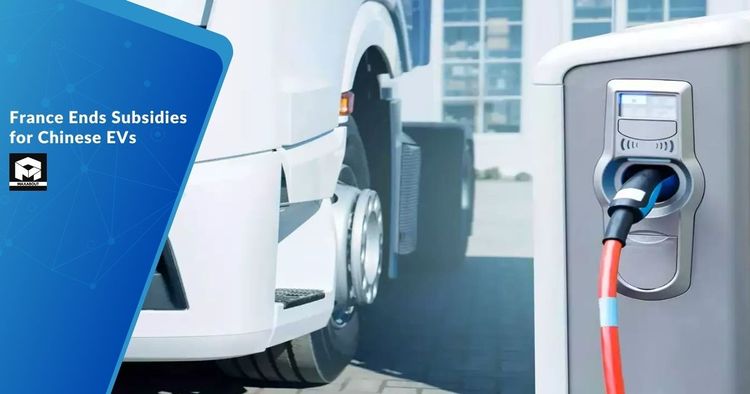On January 1, 2024, the new environmental incentive will take effect. The French government’s support for electric cars will henceforth be reliant on CO2 emissions from vehicle and battery production, as stated by President Emmanuel Macron in May. It will be based on a point system starting at the beginning of the year that takes into account several environmental factors, such as the assembly plant’s environmental footprint and the routes taken by transportation to the point of sale. Manufacturers in China are unable to achieve the requirements because coal accounts for over 60% of the country’s electrical production.
France to Stop Subsidizing Chinese EVs
The French government’s “bonus écologique,” which subsidizes electric vehicles, blatantly benefits European-made vehicles, which is clear from the recently released list of qualified vehicles. Approximately 65% of all EVs sold in France meet the eligibility requirements. Numerous models from the Stellantis Group, Renault, and German automakers are on the list of automobiles. The Tesla Model Y, which is mostly produced in Grünheide, is still qualified for the subsidy. But the Chinese-built Tesla Model 3, the Dacia Spring (produced in China), and the MG4 are no longer qualified. Moreover, BYD’s electric vehicles available in France are not included in the list. In general, there isn’t a single model from a Chinese brand included.
On January 1, 2024, the new environmental incentive will take effect. The French government’s support for electric cars will henceforth be reliant on CO2 emissions from vehicle and battery production, as stated by President Emmanuel Macron in May. It will be based on a point system starting at the beginning of the year that takes into account several environmental factors, such as the assembly plant’s environmental footprint and the routes taken by transportation to the point of sale. Manufacturers in China are unable to achieve the requirements because coal accounts for over 60% of the country’s electrical production.
Background: "Bonus Écologique" and Its Impact on EV Sales
The "bonus écologique" has long been a cornerstone of France's efforts to promote environmentally friendly transportation. However, the recent revelation that around 65% of all EVs sold in France meet the eligibility requirements sheds light on the program's inherent bias toward European-manufactured vehicles. This bias becomes especially apparent in the list of qualified models dominated by those from the Stellantis Group, Renault, and German automakers.
Stellantis, Renault, and German Automakers: The Beneficiaries
A significant portion of the qualified EV models comes from established players like Stellantis, Renault, and German automakers.
Tesla's Divergent Fate: Model Y vs. Model 3
The disparity in qualification between Tesla's Model Y and the Chinese-built Model 3 is a notable aspect of the subsidy changes. While the Model Y, primarily produced in Grünheide, remains eligible for subsidies, the Chinese-manufactured Model 3 loses its qualification.
Exclusion of Chinese Brands: BYD and Beyond
The most striking aspect of the updated list is the absence of any Chinese brand, with BYD's electric vehicles notably excluded.
Shift in Consumer Choices: Impact on Sales and Market Dynamics
As subsidies heavily influence consumer choices in the EV market, the exclusion of Chinese models could lead to a significant shift in buying patterns.
Looking Ahead: Potential Repercussions and Opportunities
As France steers its EV incentives toward European manufacturers, the global automotive landscape is likely to witness a reshuffling of market dynamics.
On January 1, 2024, the new environmental incentive will take effect. The French government’s support for electric cars will henceforth be reliant on CO2 emissions from vehicle and battery production, as stated by President Emmanuel Macron in May. It will be based on a point system starting at the beginning of the year that takes into account several environmental factors, such as the assembly plant’s environmental footprint and the routes taken by transportation to the point of sale. Manufacturers in China are unable to achieve the requirements because coal accounts for over 60% of the country’s electrical production.
Key Features
1. Unveiling the "Bonus Écologique": Examine the historical significance of France's "bonus écologique" program in promoting environmentally friendly transportation.
2. Bias Towards European-Made EVs: Analyze the revelation that approximately 65% of EVs meeting eligibility requirements are European-made.
3. Dominance of Established Players: Highlight the notable presence of Stellantis, Renault, and German automakers among the qualified EV models. Discuss how this dominance reflects the influence of established European automotive giants.
4. Tesla's Qualification Discrepancy: Investigate the divergence in qualification between Tesla's Model Y and the Chinese-built Model 3. Speculate on the criteria influencing these discrepancies and their potential impact on consumer choices.
5. Exclusion of Chinese Brands: BYD's Absence: Explore the absence of any Chinese brand, with a focus on BYD's electric vehicles not making the list.
6. Shift in Consumer Choices: Discuss the potential shift in consumer preferences resulting from changes in subsidies. Analyze how the exclusion of Chinese models might contribute to a more consolidated market.
8. Future Repercussions and Opportunities: Speculate on the potential repercussions for the global automotive landscape.
9. Perception Challenges for Chinese EVs: Address the perception challenges faced by Chinese EVs in international markets.
10. International Collaboration in the EV Era: Reflect on the broader implications for international collaboration in the electric vehicle era. Explore the need to find common ground between environmental goals and fair market practices for a cooperative global EV ecosystem.
11. Conclusion: Navigating EV Subsidy Shifts: Summarize the key takeaways from France's decision to end subsidies for Chinese EVs.
At a total cost of 1 billion euros (.07 billion) annually, the French government currently provides buyers with a cash incentive of between 5,000 and 7,000 euros for qualified models to encourage the use of electric vehicles. However, in the absence of cheap European-made EVs, a third of all incentives are going to consumers buying EVs made in China, a French finance ministry source said.

